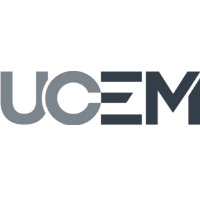
UNIVERSITY SIZE:
850 students
LOCATION:
Distance Learning Institution
ABOUT
Founded in 1919, The University College of Estate Management (UCEM) is an independent Higher Education institution which provides courses by distance learning for people in the real estate development and construction industries throughout the world. It was awarded university college status by the Privy Council in 2015.
THE CHALLENGE
Connecting with students
As a higher education provider primarily operating on a distance learning basis, UCEM was struggling to engage with their student voice and to receive continuous feedback from their campus community. Phoebe Hughes, Student Representative Liaison Officer at UCEM told us,
“As an online university, we often really struggle to connect with our students and to get our students to connect with each other. Because of our demographics, they tend to be older students who are working and time limited.”
Support for reps
The challenges of distance learning were not felt exclusively by staff members, but also their elected course representatives. According to Phoebe,
“The main challenge for our student representatives is connecting with their students. We don’t have a campus, everything is based on our VLE (virtual learning environment) and the students only have access to the module that they are currently studying on. It’s really hard for them to reach out to everybody across their programme that might be studying on a variety of modules at one time.”
As such, student representatives needed a new and innovative way to carry out their responsibilities, that will allow them to overcome the accessibility limitations of traditional feedback systems and to establish connections with a larger portion of the UCEM student population.
Improving overall NSS score
As with all higher education providers, one of UCEM’s main institutional goals is to improve the overall student satisfaction score on the National Student Survey (NSS). In particular, staff members were in search of a solution to effectively close the feedback loop and make sure that students felt that their feedback has been acted on.
Staff also needed a way to obtain valuable feedback and representative data, which allows them to pinpoint areas of the NSS (whether that be assessments, learning resources, academic support) that required immediate attention.
THE SOLUTION
In the academic year 2019-20, Unitu was piloted in seven programmes at UCEM.
Unitu provided UCEM with an easily accessible and streamlined platform that supplemented their existing feedback mechanisms, such as their existing virtual learning environment and other informal channels.
“We’ve had some really good feedback from our student reps, and they really liked that they could talk to students, and it didn’t rely on them using WhatsApp or more informal channels to connect with students. And I think it really empowered them to be able to react first to feedback, it gives them the chance to resolve things.”
THE RESULTS
Since implementing Unitu, UCEM has seen a number of benefits:
Unitu has proven to be a useful tool in creating a sense of community within the distance learning campus, thereby enabling students to engage in an exchange of ideas on how learning and teaching could be improved or what best practices are deserving of praise.
“Unitu was really helpful in creating a space where students could connect with each other, and it also gives them a reason to connect with each other – sharing ideas or issues or praise.”
Student representatives also feel much more supported and empowered when carrying out their responsibilities in collecting feedback. As Phoebe recognised,
“It also really helps our student representatives because they can easily connect with all of their students on their programmes and really get an idea of how they’re feeling.”
Staff have also reported that since Unitu, students felt more comfortable and at ease when raising their opinions about the teaching and learning of their courses. This was attributed to two integral features of the Unitu platform. Firstly, students were able to connect with their peers, understand what others were going through, and seek validation about their concerns, before raising them to a member of staff.
“It is a really good way to keep connected with your students and to get a sense of what they’re feeling and what they’re going through that maybe they wouldn’t say to a specific academic member of staff or maybe don’t quite feel like it’s at a point where they want to go to a member of staff.”
A second and related feature was that representatives would first attempt to resolve the issue on the private area of the feedback board, and will escalate the issue to staff when necessary.
“I think it’s better for the students because rather than having to talk to me about it, they’re talking directly with somebody that’s studying on their programme (their student representatives). They understand what’s going on, and have a bit more of a relationship with an academic member of staff within their department than I would do.”
Staff were also complementary of the support that they received from the Unitu team during the initial onboarding phase. As Phoebe acknowledged,
“It really exceeded our expectations in terms of how supportive the staff were at Unitu when helping us to implement it. They were really open to how we wanted to structure the board and when we needed it to be set up by, and collating all of that feedback after we finished our pilot.”
NATIONAL STUDENT SURVEY (NSS) RESULTS
In the National Student Survey 2020, UCEM saw tremendous improvements in their Student Voice scores. Notably, UCEM (Business & Management) saw an average of 11.33 increase on all its Student Voice scores, with Question 24 seeing the most improvement (a staggering 19-point rise from the previous year).


Impact summary
Unitu. 2024. All rights reserved.